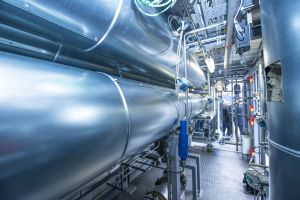Grids, storage systems, mobility, and data: The challenges associated with the energy transition require innovative solutions considering the different perspectives of society. In Karlsruhe, four partners with complementary competencies established the “Forschungspartnerschaft Karlsruhe Energie” (Karlsruhe Energy Research Partnership): Karlsruhe Institute of Technology, Stadtwerke Karlsruhe, Stadtwerke Karlsruhe
Netzservice, and the DVGW Test Laboratory of KIT’s Engler-Bunte Institute. After two years of joint work, they have now presented first results at a status colloquium.
Projects of the Karlsruhe Energy Research Partnership (FPS KA Energie) cover the four main topics of grids, storage systems, mobility, and data. Recently, first results of the following joint projects were presented: Load Prognoses for the District Heating Network of the City of Karlsruhe, Load Flexibility and Electric Storage Heaters, Gas Grid Simulation in the Context of the Energy Transition, and Possibilities of Using Liquefied Natural Gas in Baden-Württemberg.
Load Prognoses for the District Heating Network
How much heat will be needed tomorrow? It is important to reliably answer this question in order to be able to plan the desired heat supply from the Karlsruhe refinery and to optimally plan the use of heating power plants. Under FPS KA, a prognosis software was developed. In winter 2015/2016, it was used successfully to predict the demand with a low residual error of seven percent on the average. Prognosis is based on temperature prognoses for the next day and on typical patterns for the different weekdays and holidays.
Load Flexibility and Electric Storage Heaters
Supply of renewable energies varies. Hence, the demand for energy should react flexibly to supply, e.g. by the dynamic control of electric storage heaters, heat pumps, co-generation systems, heat accumulators, or the charging process of electric cars. Under FPS KA, electric storage heaters were studied in order to activate so far unused control flexibility. As a basis, household load profiles and status data of the distribution grid were used. By means of energy system models, optimized control recommendations were developed and concrete technical challenges were identified. In a next step, technical implementation on the prototype scale is planned.
Gas Grid Simulation
In the future, the existing gas grid infrastructure is planned to be used increasingly as storage, transportation, and distribution system for gases from renewable sources, such as biogas, hydrogen, or synthetic natural gas (SNG). In case of an oversupply of electricity, e.g. from wind turbines or solar facilities, power can be converted into hydrogen or methane by the so-called power-to-gas process. Vice versa, electrical energy can be supplied flexibly via gas-based co-generation systems or gas power plants. By means of simulations based on real data, major aspects for the operation of gas grids, such as compliance with hydrogen limits or regulations for customer billing, are studied.
LNG in Baden-Württemberg
Energy density of liquefied natural gas (LNG) is comparable to that of liquid fuels. Hence, LNG may be applied as low-emission fuel in trucks, shipping industry or for covering peak loads in the power grid. Under FPS KA, possibilities of using LNG in Baden-Württemberg are studied. It is analyzed whether supply security will be improved by the construction of an LNG store in Baden-Württemberg. Due to its central location in terms of transport, Karlsruhe would be highly suited for construction of a so-called LNG hub. Within the framework of the project, various technologies and the establishment of the infrastructure required for various scenarios are evaluated.
The Karlsruhe Energy Research Partnership (FPS KA Energie) contributes to the energy transition. The four cooperation partners, namely, Karlsruhe Institute of Technology (KIT), Stadtwerke Karlsruhe GmbH (SWK), Stadtwerke Karlsruhe Netzservice GmbH (SWKN), and the DVGW Test Laboratory of KIT’s Engler-Bunte Institute (DVGW-EBI; DVGW: German Technical and Scientific Association for Gas and Water) cooperate to develop a sustainable energy supply system. The partners pool complementary competencies and resources for the development and implementation of advanced and innovative solutions for future energy systems. They study technical, ecological, economic, legal and regulatory as well as socio-political issues and, in addition, plan to promote close-to-practice education of students at KIT. Systematic research into grids, storage systems, mobility, and data is based on three research platforms existing in Karlsruhe: The GasPlus-Lab, the Energy Lab 2.0, and Quartier Zukunft (District Future). Joint Projects under FPS KA Energie in particular focus on the following topics: Grids for grid-bound energy supply and their coupling, storage technologies, virtual power plants, gas-plus technologies, gas and electric mobility, innovative types of use of renewable energies, and energy-related aspects of sustainable urban development.
More about the KIT Energy Center: http://www.energie.kit.edu
In close partnership with society, KIT develops solutions for urgent challenges – from climate change, energy transition and sustainable use of natural resources to artificial intelligence, sovereignty and an aging population. As The University in the Helmholtz Association, KIT unites scientific excellence from insight to application-driven research under one roof – and is thus in a unique position to drive this transformation. As a University of Excellence, KIT offers its more than 10,000 employees and 22,800 students outstanding opportunities to shape a sustainable and resilient future. KIT – Science for Impact.

